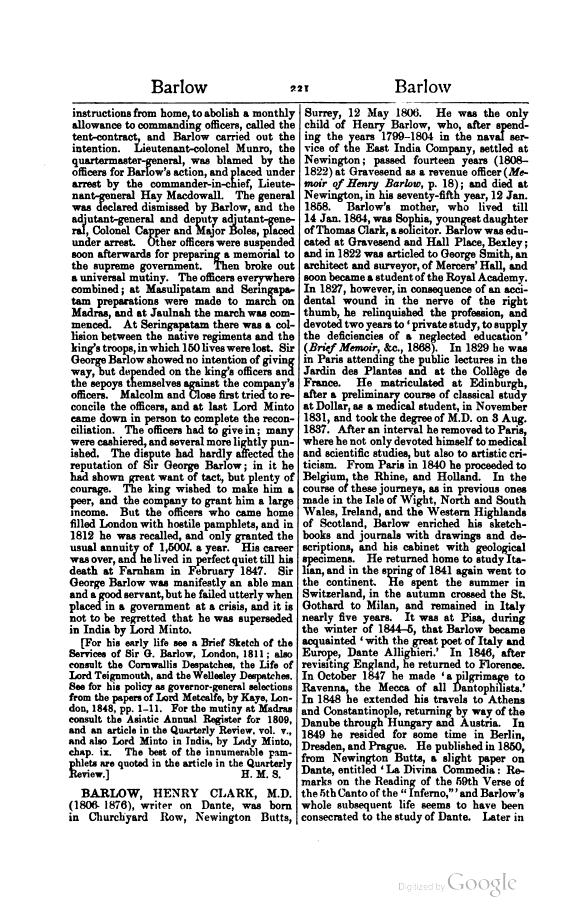instructions from home, to abolish a monthly allowance to commanding officers, called the tent-contract, and Barlow carried out the intention. Lieutenant-colonel Munro, the quartermaster-general, was blamed by the officers for Barlow's action, and placed under arrest by the commander-in-chief, Lieutenant-general Hay Macdowall. The general was declared dismissed by Barlow, and the adjutant-general and deputy adjutant-general, Colonel Capper and Major Boles, placed under arrest. Other officers were suspended soon afterwards for preparing a memorial to the supreme government. Then broke out a universal mutiny. The officers everywhere combined; at Masulipatam and Seringapatam preparations were made to march on Madras, and at Jaulnah the march was commenced. At Seringapatam there was a collision between the native regiments and the king's troops, in which 150 lives were lost. Sir George Barlow showed no intention of giving way, but depended on the king's officers and the sepoys themselves against the company's officers. Malcolm and Close first tried to reconcile the officers, and at last Lord Minto came down in person to complete the reconciliation. The officers had to give in; many were cashiered, and several more lightly punished. The dispute had hardly affected the reputation of Sir George Barlow; in it he had shown great want of tact, but plenty of courage. The king wished to make him a peer, and the company to grant him a large income. But the officers who came home filled London with hostile pamphlets, and in 1812 he was recalled, and only granted the usual annuity of 1,500l. a year. He was made G.C.B. in 1815. He lived in retirement till his death at Farnham 18 Dec. 1846. Sir George Barlow was manifestly an able man and a good servant, but he failed utterly when placed in a government at a crisis, and it is not to be regretted that he was superseded in India by Lord Minto.
[For his early life see a Brief Sketch of the Services of Sir G. Barlow, London, 1811; also consult the Cornwallis Despatches, the Life of Lord Teignmouth, and the Wellesley Despatches. See for his policy as governor-general selections from the papers of Lord Metcalfe, by Kaye, London, 1848, pp. 1–11. For the mutiny at Madras consult the Asiatic Annual Register for 1809, and an article in the Quarterly Review, vol. v., and also Lord Minto in India, by Lady Minto, chap. ix. The best of the innumerable pamphlets are quoted in the article in the Quarterly Review.]
BARLOW, HENRY CLARK, M.D. (1806–1876), writer on Dante, was born in Churchyard Row, Newington Butts, Surrey, 12 May 1806. He was the only child of Henry Barlow, who, after spending the years 1799–1804 in the naval service of the East India Company, settled at Newington; passed fourteen years (1808–1822) at Gravesend as a revenue officer (Memoir of Henry Barlow, p. 18); and died at Newington, in his seventy-fifth year, 12 Jan. 1858. Barlow's mother, who lived till 14 Jan. 1864, was Sophia, youngest daughter of Thomas Clark, a solicitor. Barlow was educated at Gravesend and Hall Place, Bexley; and in 1822 was articled to George Smith, an architect and surveyor, of Mercers' Hall, and soon became a student of the Royal Academy. In 1827, however, in consequence of an accidental wound in the nerve of the right thumb, he relinquished the profession, and devoted two years to ‘private study, to supply the deficiencies of a neglected education’ (Brief Memoir, &c., 1868). In 1829 he was in Paris attending the public lectures in the Jardin des Plantes and at the Collège de France. He matriculated at Edinburgh, after a preliminary course of classical study at Dollar, as a medical student, in November 1831, and took the degree of M.D. on 3 Aug. 1837. After an interval he removed to Paris, where he not only devoted himself to medical and scientific studies, but also to artistic criticism. From Paris in 1840 he proceeded to Belgium, the Rhine, and Holland. In the course of these journeys, as in previous ones made in the Isle of Wight, North and South Wales, Ireland, and the Western Highlands of Scotland, Barlow enriched his sketch-books and journals with drawings and descriptions, and his cabinet with geological specimens. He returned home to study Italian, and in the spring of 1841 again went to the continent. He spent the summer in Switzerland, in the autumn crossed the St. Gothard to Milan, and remained in Italy nearly five years. It was at Pisa, during the winter of 1844–5, that Barlow became acquainted ‘with the great poet of Italy and Europe, Dante Allighieri.’ In 1846, after revisiting England, he returned to Florence. In October 1847 he made ‘a pilgrimage to Ravenna, the Mecca of all Dantophilists.’ In 1848 he extended his travels to Athens and Constantinople, returning by way of the Danube through Hungary and Austria. In 1849 he resided for some time in Berlin, Dresden, and Prague. He published in 1850, from Newington Butts, a slight paper on Dante, entitled ‘La Divina Commedia: Remarks on the Reading of the 59th Verse of the 5th Canto of the “Inferno,”’ and Barlow's whole subsequent life seems to have been consecrated to the study of Dante. Later in
